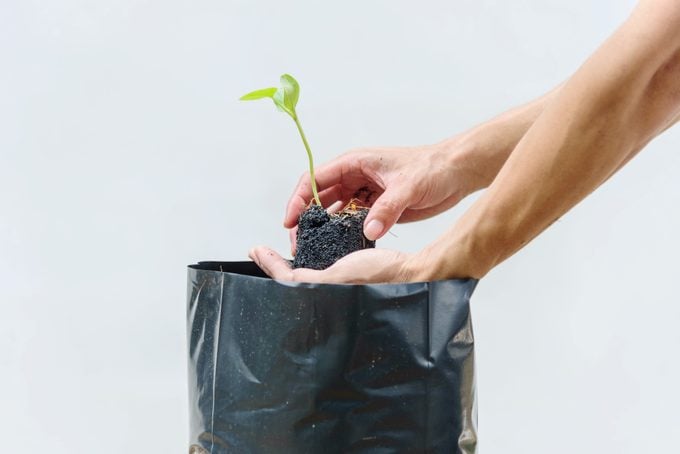Have you seen fabric bags in the planter section of your local garden center? If you were curious about these fabric garden containers, you’re not alone.
Although still less common than solid planters, grow bags are no longer a niche gardening tool. They’ve boomed in popularity in recent years, and for good reason. Garden grow bags are a convenient alternative to the bulky containers we’re used to.
What Are Garden Grow Bags?
“Grow bags are durable bags that you can grow plants in,” says Shelby DeVore, founder of Farminence and an experienced professional gardener with a master’s degree in agriculture. DeVore adds grow bags are almost as durable as plastic flower pots and can be more eco-friendly, depending on the material.
“Most grow bags are made of durable, breathable materials like thick felt or canvas,” DeVore says. Others, DeVore says, are made of or coated with plastic, like a tarp or reusable grocery bag. DeVore recommends the felt or canvas versions for their durability and growing potential.
Most grow bags are round with handles and rest on the ground. They also come in other styles, and many sizes. “Dome tomato grow bags are designed to hang the plant upside down,” DeVore says, “similar to how the Topsy Turvy tomato containers work.”
Potatoes grow bags are another popular innovation. “Potato grow bags have a flap at the bottom that can be lifted so that you can harvest potatoes without digging the whole plant up,” says DeVore. This cuts down harvest and cleanup time, and allows the plant to continue producing potatoes.
Grow Bags vs. Traditional Planters
Grow bags have a few benefits over traditional planters. They’re more lightweight so they’re easier to move around the yard or patio, and their flexibility makes them easier to store. Just fold the bag flat and tuck it away for winter. They won’t crack in the cold like other planters will, so you can even store them outside. The breathable fabric lets roots get more airflow.
Downsides? While the fabric provides more air, it “will not hold water and nutrients the same way that a hard concrete or plastic container would,” DeVore says. This means more watering. “Other than that,” DeVore adds, “you can use them the same way that you would use a traditional container.”
They’re not as pretty as traditional pots either. There are color and pattern options, but you won’t get the same look as a glazed ceramic pot.
Best Plants for Grow Bags

Almost any plant you can grow outside or in a container will do fine in a grow bag. However, DeVore recommends planting annuals in grow bags so you can refresh the soil each year. “Herbs, flowering annuals, and vegetable plants are all excellent choices for putting in grow bags,” Devore says.
Some specific types of plants require specific grow bags, like potatoes, other root vegetables and tubers, and strawberries. Some grow bags even come with a cage to support tomatoes or climbing plants.
How To Use Grow Bags
For the most part, grow bags work like ceramic or plastic pots. The biggest difference is how fast the soil dries. “It’s a good idea to add a moisture control potting mix to help the soil maintain moisture,” DeVore says. Adding compost and mulch to improve soil moisture and nutrition.
Be sure to use potting soil, not garden soil, and select the right size grow bag for your chosen plant. Tomatoes will need a larger grow bag than herbs. And place the grow bag in a suitable sunny spot. Keep it watered and fertilized as necessary for the plant, and you’re sure to have a beautiful grow bag container garden all season.
Article source here: How To Use Grow Bags in Your Garden


No comments:
Post a Comment